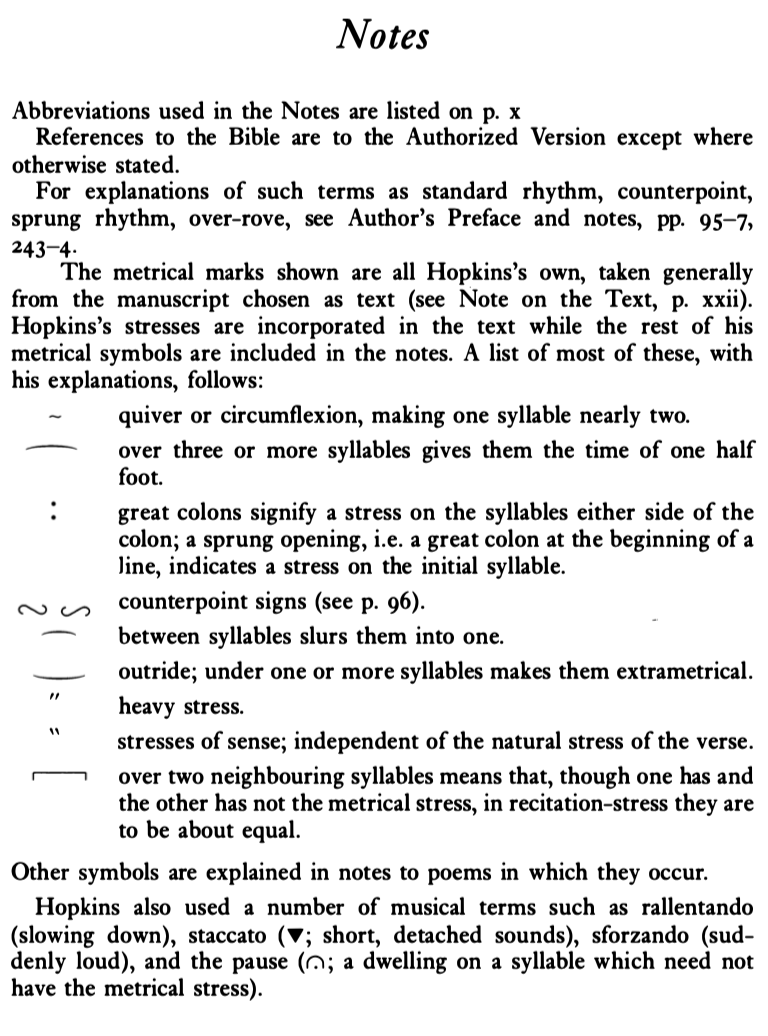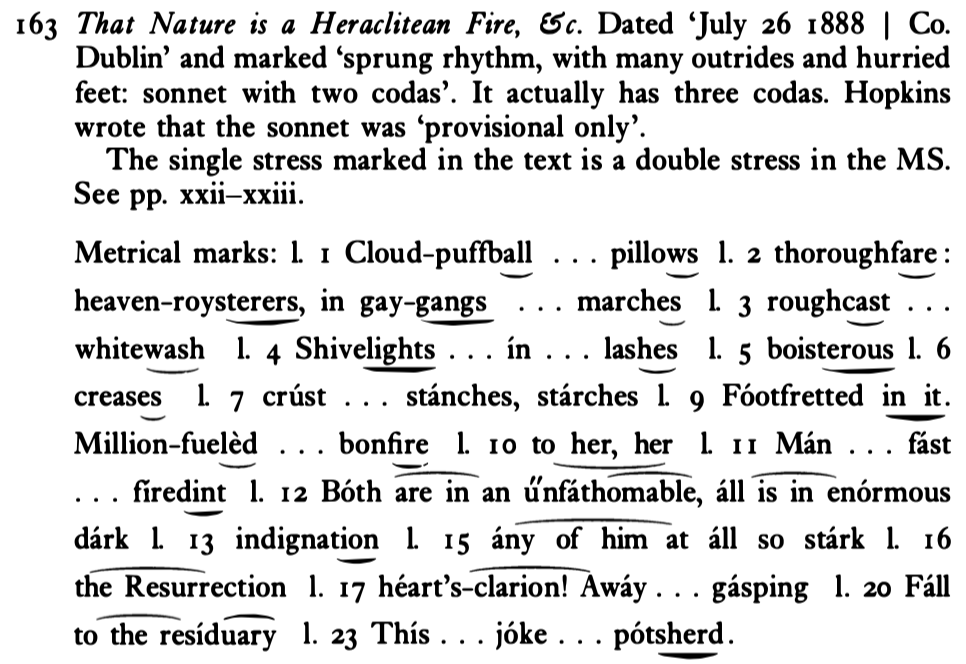Pied Beauty, etc.
1 Glory be to God for dappled things— 2 For skies of couple-colour as a brinded cow; 3 For rose-moles in all stipple upon trout that swim; 4 Fresh-firecoal chestnut-falls; finches' wings; 5 Landscape plotted and pieced—fold, fallow, and plough: 6 And áll trádes, their gear and tackle and trim. 7 All things counter, original, spáre, strange; 8 Whatever is fickle, frecklèd (who knows how?) 9 With swíft, slów; sweet, sóur; adázzle, dím; 10 He fathers-forth whose beauty is pást change: 11 Práise hím.
This is a “curtal” sonnet; where did the missing lines go? One senses a volta at line 7, since it begins a new sentence and moves from list to generalization: all, whatever. The basic formula is 6+4 1/2.
1 Cloud-puffball, torn tufts, tossed pillows | flaunt forth, then chevy on an air-
2 Built thoroughfare: heaven-roysterers, in gay-gangs | they throng; they glitter in marches.
3 Down roughcast, down dazzling whitewash, | wherever an elm arches,
4 Shivelights and shadowtackle in long | lashes lance, lance, and pair.
5 Delightfully the bright wind boisterous | ropes, wrestles, beats earth bare
6 Of yestertempest's creases; | in pool and rut peel parches
7 Squandering ooze to squeezed | dough, crust, dust; stanches, starches
8 Squadroned masks and manmarks | treadmire toil there
9 Footfretted in it. Million-fuelèd,| nature's bonfire burns on.
10 But quench her bonniest, darest | to her, her clearest-selvèd spark
11 Man, how fast his firedint, | his mark on mind, is gone!
12 Both are in an unfathomable, all is in an enormous dark
13 Drowned. O pity and indig | nation! Manshape, that shone
14 Sheer off, disserval, a star, | death blots black out; nor mark
Is any of him at all so stark
15 But vastness blurs and time | beats level. Enough! the Resurrection,
16 A heart's-clarion! Away grief's gasping, | joyless days, dejection.
Across my foundering deck shone
17 A beacon, an eternal beam. | Flesh fade, and mortal trash
18 Fall to the residuary worm; | world's wildfire, leave but ash:
In a flash, at a trumpets crash,
19 I am all at once what Christ is, | since he was what I am, and
20 This Jack, joke, poor potsherd, | patch, matchwood, immortal diamond,
Ιs immortal diamond.
Now this is a “caudate” or “tailed” sonnet. It has three “codas” marked by the last three tailed couplets. I’m tempted to loop the far-indented half-lines in with their predecessors to preserve the idea that this is a 14-line sonnet with 6 lines added.
There are doubtless many words to be looked up—“shivelight”—a sliver of light (OED). This seems to be a hapax legomenon, a word only used once in the English language, by this poet. “Shive” is related to “sheave.” The nice thing about this word is it denotes chaff, fluff, flax, hemp, paper—and thus is more acutely adjacent to burning. “Roisterer” is the standard spelling of the word he uses—a reveller. Other unique words are largely hyphenations or portmanteaus of words that are otherwise fairly common.
Here are some notes on his metrical markings, which are not included in the book:


It’s striking how musical this notation is. Here are some other suggested poems:
As kingfishers catch fire
(As kingfishers catch fire, dragonflies draw flame;)The Windhover
(I caught this morning morning's minion, king-)Binsey Poplars
(My aspens dear, whose airy cages quelled,)
- Gerard Manley Hopkins: Selected Poetry. ed. Catherine Phillips, Oxford UP, 1996.
- “Curtal Sonnet”, “Caudate Sonnet.” Princeton Encyclopedia of Poetry and Poetics, Princeton UP, ed. Roland Greene, Stephen Cushman, et al., 2012, pp. 216, 327.